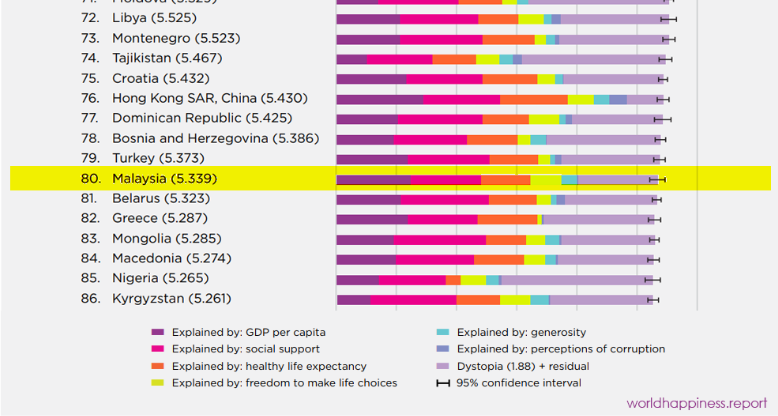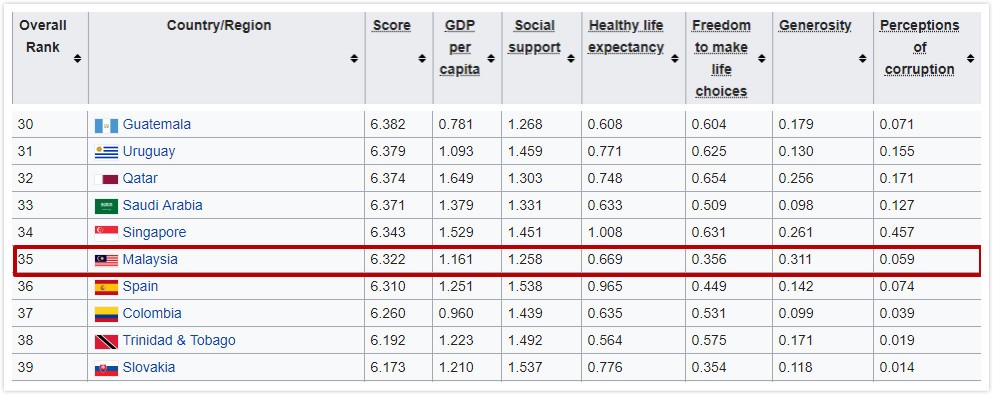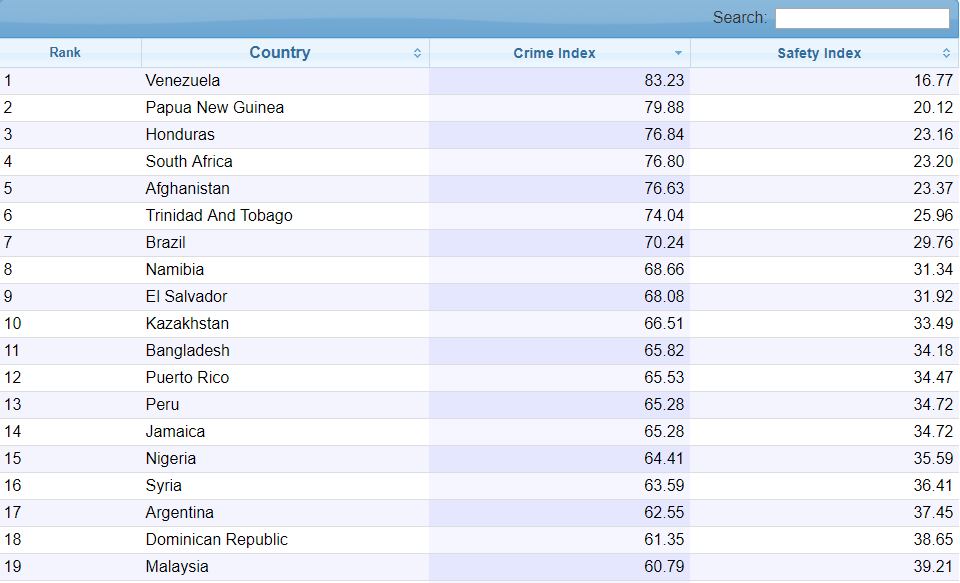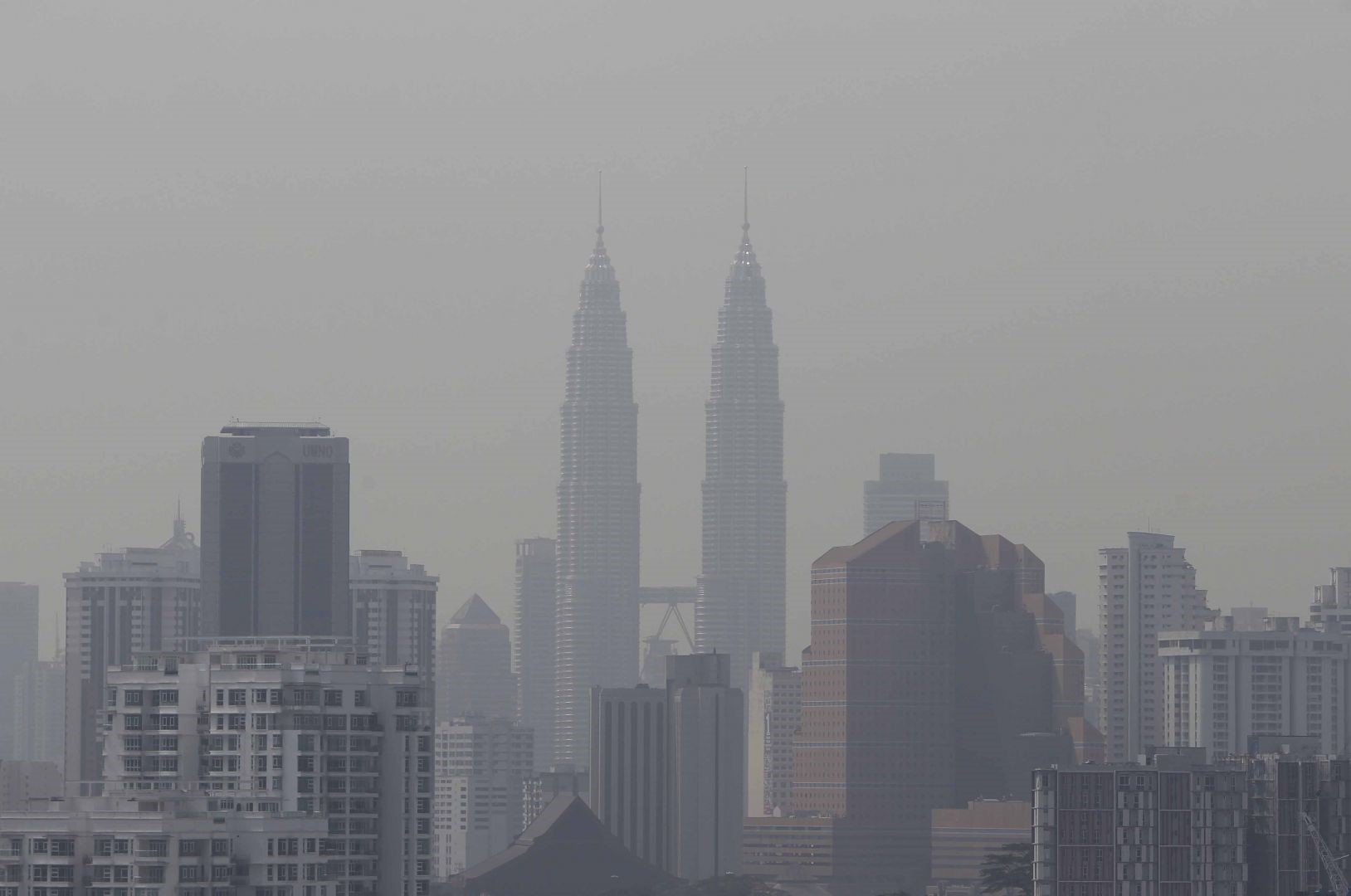By Ma Feiya
Malaysia ranked 80th in the 2019 World Happiness Report (covering the overall performance from 2015 to 2017) and dropped 45 places compared to 35th in 2018.

The World Happiness Report is a United Nations survey of global well-being. It ranks 156 countries on the basis of per capita GDP, life expectancy of citizens, satisfaction with life, per capita consumption of resources, environmental pollution, generosity, and corruption.

In the 2018 report (covering the overall performance from 2015 to 2017), Malaysia’s performance is very good, ranking 35th in the world, second only to neighboring Singapore (ranked 34th), a ranking of happiness index in Southeast Asian countries. Second, the happiness index in Asian countries ranks third.
But why did the ranking fall sharply this year?
We all know that Malaysia is a multi-ethnic and pluralistic country. But it also means that there are always conflicts. Even in the streets, there will be gunfights between police and robbers.
According to the 2019 World Crime Rate Ranking, Malaysias crime rate in Southeast Asia is the highest. Even in the past few years, it has ranked in the top 20 in the world crime rate ranking. This is simply too unbelievable. To know that Malaysia was once one of the safest countries in Asia, and now as a developing country, the crime rate is comparable to that of a third world country.


Large cities with complex social environments are more likely to breed crime than in the countryside. Theft, robbery, murder, drug trafficking, rape, destruction of official duties, etc., urban crimes are varied.
Although it is an indisputable fact that crime rates are high in all parts of the world, it is rare for “popular” looting cases such as breaking windows, robbing property and killing in Malaysia nowadays. So, if we travel to countries with high security rates, even in the middle of the night, strange streets are safer than walking in the streets of the familiar local big cities?
According to Numbeo, the Klang crime rate is as high as 68%. As a capital city, the crime rate in Kuala Lumpur is as high as 66.55%, Johor Bahru is 58.58%, and Kuching and Penang are 47.1% and 41.62% respectively.

Why is the crime rate high?
The high crime rate is basically not related to human nature, rather it is economic problems and lack of police force, but the former is more critical. If the economy is not improving, inflation, adultery and looting will always plague local citizens, and tourists will be discouraged, further dragging down the economy.
Moreover, as a neighbour of Malaysia, Thailand, which allows citizens to hold guns, is the country with the largest number of guns owned by civilians in Southeast Asian countries. This has led to the influx of many illegal guns into Malaysia, making the bandits more daring! It’s also a great headache for the police.
Second, the gangsters specifically took time to commit crimes. The gangsters are very familiar with the police patrol time, and the residential areas are well-connected, with no obstructions, which is extremely convenient for theft and escape.
On the other hand, with the changes in the socio-economic structure, the community system is gradually changing. People are no longer familiar with each other, and everyday life relies on modern means of transportation, leading to an ever-expanding range of crimes. With the advent of the Internet age, communication is more convenient, which opens the door for criminal groups, smuggling drugs, human trafficking, online fraud and so on.
Other Reasons
As the survey shows, the World Happiness Report uses global voting data to measure how satisfied people are about their lives. Over the years, the Nordic countries have occupied almost the top 10 positions. Last year, Norway ranked first and Finland this year. This also shows that a happy society must also be supported by a good healthy social environment.
Therefore, happiness index should not only focus on crime rate or safety issues, but also on environmental changes and people’s growing needs, such as psychological and physical health problems, environmental pollution, loss of community awareness, and a decline in social trust.
When life safety is threatened, how do we talk about happiness? From 2015 to 2019, reports of environmental pollution in various parts of Malaysia have caused public health problems. On October 4, 2015, the air pollution index was severe in many parts of Malaysia, and the smog continued, causing the school to suspend classes. On March 7, 2019, Pasir Gudang’ s chemical waste polluted the river water, causing the river to become turbid, many of fish died, and the odour continued. A total of 35 victims were vomiting and fainting and having breathing difficulties after inhaling methane gas. And the catch was reduced. The fishermen suffered economic losses.
Science and technology are more and more developed, new technologies are constantly updated, and new apps are constantly on the shelves. In shops, restaurants, and even schools, there are people who bend their heads and concentrate on mobile phones. According to the latest figures from ‘Hootsuite’ and ‘We are Social’, the Internet penetration rate in Malaysia is 80%, and the average online time of users is 8 hours and 5 minutes per day.
People are keen to praise, comment and respond to strangers on social media, but they rarely communicate with their families and friends in real life, gradually alienating and decreasing their trust in each other.
Whether it is economic, social or human psychological reasons, it is hoped that the people living in Malaysia will become happier. ***
